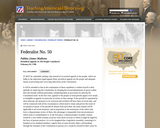
In this essay, Madison addresses periodical appeals as proper and adequate means of preventing and correcting infractions of the Constitution.
- Subject:
- Social Studies
- Material Type:
- Reading
- Provider:
- Teaching American History
- Date Added:
- 06/30/2017

In this essay, Madison addresses periodical appeals as proper and adequate means of preventing and correcting infractions of the Constitution.
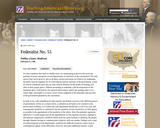
James Madison, like most Americans at the time, understood that once a single branch of government — legislative, executive or judicial — had accumulated all political power in its hands, nothing could stop it from acting tyrannically. The checks and balances between the branches built into the proposed Constitution, he explained in Federalist 51, are therefore essential to keep those powers properly separated among the branches. In the midst of explaining these “inventions of prudence,†Madison offered thoughtful reflections on why human nature makes politics — especially the great task of framing a government comprised of men rather than angels — so challenging.
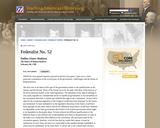
Madison introduces the “more particular examination of the several parts of the government,†with ten essays on the House of Representatives. He organizes the treatment around “five views.†1) “The qualification of electors†is completely covered and 2) the duration in office is partially covered in Federalist 52. With regard to the former, he says the electoral “door†is wide “open to merit of every description,†regardless of place of birth, “young or old, and without regard to poverty or wealth, or to any particular profession of religious faith.†Concerning the latter, he reminds the reader that “the scheme of representation as a substitute for a meeting of the citizens in person being at most but very imperfectly known to ancient polity, it is in more modern times only that we are to expect instructive examples.â€
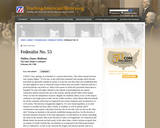
Madison continues his discussion from Federalist No 52 concerning the duration in office.
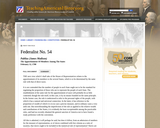
In this essay, Madison addresses the apportionment of members among the states.
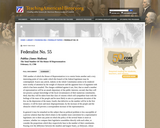
In this essay, Madison addresses the total number of the House of Representatives.
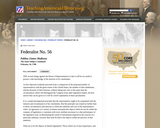
In this essay says that the kind of information the representatives need to assist their constituents, echoing Federalist 35 and 53, is knowledge about “commerce, taxation, and the militia,†rather than “particular knowledge of their affairs."
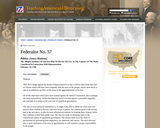
This is the third essay on 4) “the number of which the House of Representatives is to consist.†It addresses the “third chargeâ€: c) the chosen representatives will “have least sympathy with the mass of the people,†and be inclined to “sacrifice†the interests of the people. Madison describes this objection as “extraordinary,†because “the principle of it strikes at the very root of republican government.†The objective, says Madison, is to elect wise and virtuous representatives and then adopt “precautions†to keep them that way whilst in office. The primary method of keeping the representatives virtuous is a “habitual recollection of their dependence on the people.†But “human prudence†has “devised†four “cords by which they will be bound to fidelity and sympathy with the great mass of the peopleâ€: “duty, gratitude, interest, ambition.â€
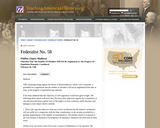
This is the fourth and final essay on 4) “the number of which the House of Representatives is to consist.†It addresses the “remaining chargeâ€: “the number of representatives will not be augmented†as the population increases. Madison admits, “this objection, if well supported, would have great weight.†But, he continues, “there is a peculiarity in the federal Constitution which insures a watchful attention…: to a constitutional augmentation.†The four largest states “will have a majority of the whole votes in the House,†and since they hold the power of the purse, “the most complete and powerful weapon with which any constitution can arm the immediate representatives of the people, for obtaining a redress of every grievance, and for carrying into effect every just and salutary measure,†these states can defeat “unfriendly†opposition in the Senate. Madison, in conclusion, warns about increasing the size of the House “beyond a certain limit.†Experience demonstrates “that the countenance of the government may become more democratic, but the soul that animates it will be more oligarchic.â€
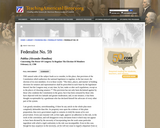
This is the first of three essays on 5) “the times, places, and manner†clause. Hamilton states the case for this clause: “every government ought to contain in itself the means of its own preservation.†What if “the leaders of a few of the most important States should have entered into a previous conspiracy to prevent an election?â€
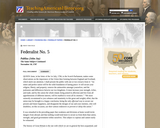
This resource provides information on Federalist No. 5. The Federalist Papers were originally newspaper essays written by Alexander Hamilton, James Madison, and John Jay under the pseudonym Publius, whose immediate goal was to persuade the people of New York to ratify the constitution.
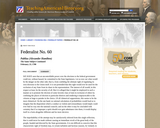
This is the second of three essays on 5) “the times, places, and manner†clause. Couldn’t this clause be manipulated to confine “the places of election to particular districts and rendering it impracticable to the citizens at large to partake in the choice?†This, says Hamilton, is “the most chimerical†of “all chimerical propositions.†Hamilton continues: “to speak in the fashionable language of the adversaries of the Constitution,†will this clause “court the elevation of the wealthy and the well-born, to the exclusion and debasement of all the rest of the society?†“No,†because of the multiplicity of interests, the separation of powers, and the scheme of representation.
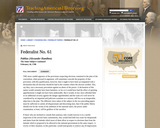
This is the third of three essays on 5) “the times, places, and manner†clause. Here the defense of the clause moves beyond the argument that it is necessary and proper to “a positive advantage.†In conclusion, “I allude to the circumstance of uniformity in the time of elections for the federal House of Representatives.â€
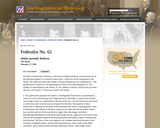
This is the third of three essays on 5) “the times, places, and manner†clause. Here the defense of the clause moves beyond the argument that it is necessary and proper to “a positive advantage.â€
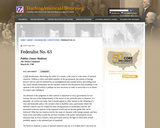
This essay contains twenty-one paragraphs. The first six paragraphs of the essay concludes the fifth and sixth part of 4) “the number of Senators and the term for which they are to be elected.†Madison then turns in paragraph seven to protecting the people “against their own temporary errors and delusions.†Paragraphs 8 through 14 revisit the sufficiency of the extended orbit and what the ancients knew about the principle of representation. The essay concludes with a consideration of the Antifederalist claim that the Senate will become a “Tyrannical Aristocracy.â€
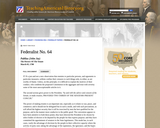
This is the first of three essays on 5) “the powers vested in the Senate.†The essay covers the “advise and consent†clause concerning the treaty making power that the Senate shares with the President.
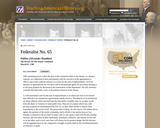
This essay covers the impeachment-conviction power. The Senate, and neither the House nor the Supreme Court, is the “tribunal sufficiently dignified†and “sufficiently independent†to render the sentence of “perpetual ostracism from the esteem and confidence and honors and emoluments of his country†for official “POLITICAL†misconduct.
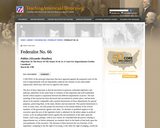
This is the last of three essays on 5) “the powers vested in the Senate.†This essay concludes the defense of locating of the “determining in all cases of impeachment†power alone in the Senate. This power does not 1) violate the doctrine of the separation of powers, 2) “give to the government a countenance too aristocratic,†or produce a conflict of interest with the Senate-Executive 3) appointment power, or 4) treaty making power.
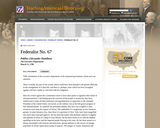
This is the first of eleven essays written by Hamilton defending the Presidency against the “unfairness†of the Antifederalist “representations.†This is the first of six essays in The Federalist that identify specific authors of Antifederalist writings.
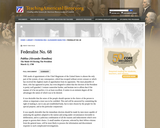
This is the second of eleven essays written by Hamilton defending the Presidency Presidency against the “unfairness†of the Antifederalist “representations.†This is the second of six essays in The Federalist that identify specific authors of Antifederalist writings.